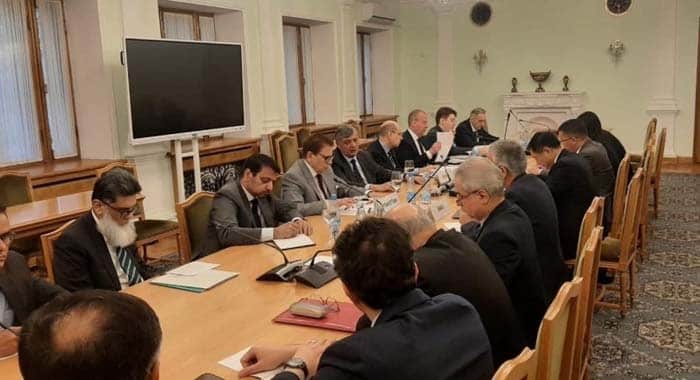In a powerful display of regional unity, Pakistan, Russia, China, and Iran have vowed to safeguard Afghanistan’s independence and prevent it from descending once again into instability and militancy. The four nations met in Moscow to reinforce a shared vision of an Afghanistan free from terrorism, foreign interference, and external domination a vision anchored in collective security and mutual respect for sovereignty.
Pakistan’s Special Envoy for Afghanistan, Mohammad Sadiq Khan, said that representatives from the four countries held comprehensive consultations to advance joint efforts for peace and stability in Afghanistan. He noted that the discussions reflected an emerging regional consensus on supporting Afghanistan’s sovereignty and addressing the persistent threat of transnational terrorism.
“The talks focused on coordinated regional strategies to ensure that Afghanistan remains peaceful, independent, and free from the scourge of terrorism,” Sadiq stated in a post on X. “All four countries underlined that a stable Afghanistan, free from external interference, is critical to the region’s future security and prosperity.”
Participants voiced grave concern over the continued presence of militant organizations including Tehrik-i-Taliban Pakistan (TTP), the Baloch Liberation Army (BLA), the East Turkestan Islamic Movement (ETIM), Jaish al-Adl, ISIS, and al-Qaeda. These groups, they warned, threaten not only Afghanistan’s internal peace but also the broader regional stability.
The four nations agreed on the urgent need to enhance intelligence sharing, strengthen border management, and expand joint counterterrorism operations. They reaffirmed their commitment to upholding Afghanistan’s territorial integrity and ensuring that its soil is never used to destabilize neighboring states.
Russia’s Foreign Ministry confirmed that the meeting took place ahead of the seventh round of the Moscow Format consultations on Afghanistan and included discussions on drafting a unified final document. The ministry described the dialogue as a testament to the growing regional determination to pursue Afghan stability through cooperation rather than confrontation.
A key outcome of the meeting was the adoption of a unified stance against the establishment of any foreign military bases within Afghanistan. The delegates declared that such moves would constitute a direct violation of Afghanistan’s sovereignty and risk reigniting regional tensions.
Analysts say the Moscow meeting marks a significant geopolitical development, signaling that the regional powers are increasingly intent on taking ownership of Afghanistan’s peace process without reliance on Western mediation. With terrorism and instability posing renewed challenges, Pakistan, Russia, China, and Iran now appear firmly aligned in building a secure, self-reliant, and neutral Afghanistan — one that contributes to, rather than endangers, regional peace and prosperity.





